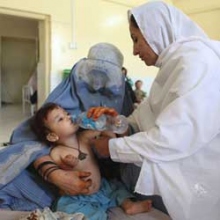To grow up a Palestinian Refugee in Lebanon
Growing up can be hard anywhere in the world, but growing up a Palestinian refugee in Lebanon can be even harder.
| Young girls in the Shatila camp, Beirut |
In Lebanon, Palestinian refugees are denied fair and equal access to the state education system. With the cost of funding a child’s place in a private school being one of the highest in the region and Palestinian refugees being some of the most disadvantaged and deprived in the region, Palestinian children rely on UNRWA and non-profit organisations for the provision of both primary and secondary education.
Every child should be awarded the right to access an education that inspires and fully equips him or her to leave school as a young adult with the confidence and means to participate fully in social, economic, religious, cultural and political life.
Yet, for many of Lebanon’s Palestinian refugees, more than two thirds of whom are living in severe poverty, the prospects they face can be less than inspiring. The employment restrictions to which they will be subjected when they grow up will leave many wholly dependent on UNRWA both as a main relief provider and main employer. Unemployment rates for refugees are therefore staggering. Consequently, many young people, despairing at their future prospects, perceive education to be irrelevant. Commitment to one’s own education is therefore very often low, whilst drop-out rates are high.
If young boys drop out from school they most often seek employment in the form of unskilled temporary manual labour in order to support their families. One third of the Palestinian workforce does enter into some form of vocational training which awards them marketable skills and the prospect of securing employment in the tertiary sector. For a small group, approximately 12%, this is obtained through formal education. However, for the majority this is delivered by non-profits or obtained on the job. Extensive studies and anecdotal evidence show that vocational training or university education can help refugees secure more, and better, jobs. We estimate that around half of young people aged 16 – 18 are presently enrolled in some form of vocational and technical training, however crude such training may be; while the demand is much higher.
While for many boys it is the socio-economic conditions he faces, and the feeling of obligation to work to support his family that sees him drop out at a young age; many girls fail to complete their education due to early marriage – and their average age at marriage has been decreasing in recent years. Troublingly, many young people have overall poor emotional well-being and engage in risky behaviours, with one young person out of four feeling unable to resist peer pressure. Great social pressure is exerted, particularly on girls, to correspond to specific models and peer and youth-adult relationships suffer from conflict, misunderstanding and miscommunication. Young people are also vulnerable to abuse, and victims are frequently blamed. With vivid memories of violence imposed on their families, and in the face of poor socio-economic prospects and ill health, conflict as well as physical and verbal aggression, is sadly widespread amongst young people in the camps. Worryingly, a quarter of young people approve of violence and domestic violence in certain circumstances; a finding which correlates to the high and increasing prevalence of violence against women and children.
With the violence permeating Syria displacing increasing numbers of Palestinian refugees once more and forcing them into illegal status in Lebanon; we can only ask when the world will begin to offer rights to those who are most in need.
by Sarah Barnes (Project Manager, SCEME)
Charbel Submits Draft Law to Grant Women Full Citizenship Rights
We were delighted to learn that, following years of protest, Lebanese Interior Minister Marwan Charbel has submitted two versions of a draft law that could potentially allow women to pass their nationality on to their children.
At present, women simply do not have the same citizenship rights as men. Whilst Lebanese men are permitted to pass their nationality on to their children should they choose to marry a non-Lebanese woman; Lebanese women – and their children – have been denied this right.
However, SCEME is concerned that Charbel’s laws are still not going to be enough.
One version of the law excludes women who choose to marry Palestinian men. The discriminatory view held by some political groups within Lebanon, who fear allowing women the right to pass on their nationality to their children and husbands may result in Palestinian men marrying purely to obtain citizenship, is a large hurdle that must be overcome if all mothers are to finally be allowed such basic rights.

